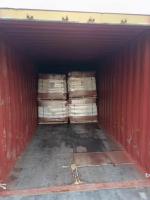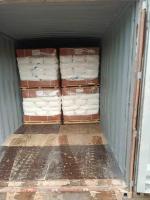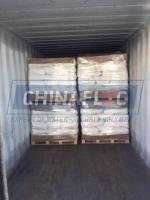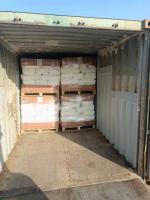Our Products
Flocculant / Cationic polyacrylamide zetag 8165 can be replaced by Chinafloc C6014

Cationic flocculants like Zetag 8165 play a critical role in solid-liquid separation processes across various industries. Zetag 8165 is a high-performance cationic polyacrylamide-based flocculant, widely known for its ability to improve sludge dewatering and wastewater clarification. Manufactured by BASF (now part of Solenis), the Zetag series is specifically engineered to meet the challenges of industrial and municipal wastewater management. Among the Zetag products, Zetag 8165 is renowned for its high cationic charge density and very high molecular weight, making it highly efficient for flocculating negatively charged particles and organic solids.
The main application of Zetag 8165 is in sludge dewatering, especially in municipal and industrial wastewater treatment plants, where it significantly enhances the efficiency and quality of dewatering operations. This article outlines the chemistry, mechanism, primary uses, and advantages of Zetag 8165 in wastewater treatment systems.
Chemical Nature of Zetag 8165
Zetag 8165 is a synthetic, water-soluble cationic polyacrylamide supplied as a fine granular powder. It is designed to dissolve quickly in water, forming a viscous solution that exhibits high activity due to the strong positive charge on its polymer chains.
Key chemical features:
-
Type: Cationic polyacrylamide
-
Form: Dry powder
-
Charge density: High (typically 60–80% cationicity)
-
Molecular weight: Very high (≥10 million Daltons)
-
Solubility: Fully soluble in water
-
Recommended dosage: 1–10 g/m³, depending on application and solids content
Its cationic nature makes it particularly effective at flocculating negatively charged particles such as biological sludge, clay, silica, and organic matter.
Main Application: Sludge Dewatering
The core application of Zetag 8165 is in sludge dewatering processes. Sludge is a byproduct of both municipal and industrial wastewater treatment. It contains a high percentage of water (up to 98%) and a complex mix of organic and inorganic materials. Dewatering reduces the volume and weight of sludge, making it more economical to handle, transport, and dispose of or incinerate.
Application Process
Zetag 8165 is typically used in:
-
Belt filter presses
-
Centrifuges
-
Screw presses
-
Chamber filter presses
Steps in the process:
-
Polymer preparation: Zetag 8165 is dissolved in water to form a 0.1–0.5% solution.
-
Dosing: The polymer solution is added to the sludge stream, where it disperses and interacts with the suspended particles.
-
Floc formation: Cationic polymer chains neutralize the negative charges on the sludge particles, causing them to aggregate into larger, stable flocs.
-
Dewatering: These flocs are easier to dewater because of their structure and size, releasing water more readily under pressure or centrifugal force.
The result is significantly drier sludge cake, reduced polymer consumption over time, and cleaner filtrate or centrate.
Advantages of Using Zetag 8165 in Sludge Dewatering
-
High dewatering efficiency: Achieves high cake solids content and low residual moisture in the sludge.
-
Lower polymer dosage: Due to high molecular weight and charge, less chemical is needed compared to other flocculants.
-
Improved filtrate clarity: Produces low-turbidity filtrate, minimizing the load on downstream filtration or polishing systems.
-
Stronger flocs: Withstand shear forces better during mechanical dewatering.
-
Faster settling and drainage: Reduces cycle time and increases throughput of dewatering units.
-
Cost savings: Lower sludge disposal costs due to volume reduction and improved process efficiency.
Additional Applications of Zetag 8165
While sludge dewatering is its main application, Zetag 8165 is also used in other wastewater and process water treatment applications, including:
1. Primary and Secondary Clarification
In municipal and industrial wastewater plants, Zetag 8165 can be applied to:
-
Aid in the clarification of raw influent water
-
Improve the separation of activated sludge
-
Reduce suspended solids (TSS) and turbidity in secondary clarifiers
2. Thickening of Waste Activated Sludge (WAS)
Before dewatering, sludge is often thickened to reduce volume. Zetag 8165 improves the efficiency of gravity thickeners or dissolved air flotation (DAF) units by enhancing flocculation.
3. Industrial Process Water Treatment
In industries such as:
-
Food and beverage
-
Pulp and paper
-
Textile and dyeing
-
Oil and gas
Zetag 8165 is used to separate organic solids, recover valuable process water, and reduce the chemical oxygen demand (COD) of discharged effluents.
Compatibility and Performance
Zetag 8165 is compatible with most commonly used coagulants such as aluminum sulfate, ferric chloride, and polyamines. It often works in tandem with these chemicals for multi-step clarification and sludge treatment.
Optimal conditions:
-
pH range: 4 to 9
-
Mixing energy: Gentle agitation is ideal to avoid floc shear
-
Water quality: Preparation water should be clean and free from hardness or oil
It’s important to conduct jar tests or pilot trials before full-scale application to determine the best dosage and mixing conditions for the specific wastewater characteristics.
Storage and Handling
-
Shelf life: 1–2 years if kept in a dry, cool place
-
Solution stability: Prepared solutions should be used within 24–48 hours to ensure effectiveness
-
Safety: Non-toxic when handled properly, but dust may be irritating—use gloves, masks, and eye protection
Because it is a powder, proper handling is critical to avoid dust exposure and ensure accurate dosing.
Environmental Impact
Zetag 8165 is designed for low environmental toxicity, with minimal residual acrylamide monomer content. It is not biodegradable in the short term but becomes part of the sludge matrix, which is eventually treated or disposed of according to regulatory standards. Its use in optimized dosages reduces the total chemical load and promotes sustainable wastewater management.
Summary
Zetag 8165, a high-molecular-weight cationic polyacrylamide flocculant, is primarily used for sludge dewatering in municipal and industrial wastewater treatment systems. It effectively enhances the separation of solids and water by forming strong, stable flocs that dewater efficiently under mechanical pressure. Its advantages—such as low dosage requirement, improved cake dryness, and reduced operational costs—make it a preferred choice for operators seeking performance and efficiency.
Beyond sludge dewatering, Zetag 8165 also contributes to clarification, thickening, and industrial process water treatment. Its broad pH compatibility, high cationic charge density, and ease of use ensure it meets the diverse needs of modern wastewater treatment facilities. Through improved dewatering performance and reduced sludge disposal burdens, Zetag 8165 plays a vital role in sustainable and cost-effective water resource management.





